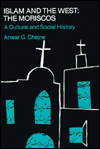
Rizwi S. Faizer Ph.D. McGill
rfaizer@yahoo.com
All content copyright
© 1998 Rizwi Faizer.
 Anwar G. Chejne.
Anwar G. Chejne.
Albany: SUNY Press, 1983.
ISBN: 0-87395-606-0
For nearly a thousand years after the crossing of the Straits of
Gibralter by the Arabs in 711 A. D., Islam had held a
special and significant place in the lands of Spain, but its position
was never as secure as it was in North Africa or Mesopotamia. In
Spain, Christian peoples never quite gave up their desire for control,
and opposition to Muslim authority soon turned into
movements of re-conquest. Reconquest did not inevitably lead to the
expulsion of the Muslims, however: in 1119 Alfonso 1 of Aragon had
permitted the Muslims, known as Mudejars because of their
decision to live in Christian lands, to be governed by an
official of their choice, in accordance with Islamic law. But religious
tensions soon turned the subordinate peoples into a beleagered minority
and their numbers further decreased as they began to escape for
North Africa. In 1499 even Granada
was taken, and it seemed that the region, which had once seen the
co-existance of Jews, Christians and Muslims, was slowly turning
exclusively Catholic. In 1525, Charles V, who had promised that
he would not
forcibly convert the Aragonese Muslims, now offered them a choice
between baptism and expulsion. Opting to remain in their homeland the
new converts in fact maintained their original faith in Islam in
secrecy. These pseudo-Christian-Muslims--recognized as
Moriscos--their way of life, their faith and practices, are
the subject of Anwar G. Chejne's discourse.
The picture painted by Chejne of the daily existence of the Morisco is
difficult to imagine. To all who did not know, he was a baptized, church-going, confessing,
Christian and Catholic who not only accepted the doctrine of
transubstantiation, but even acknowledged the powers of their numerous
saints. But those who belonged with his community knew only too well the
secret practices undertaken to nullify the obvious christian ones. The
baptized babe was brought home and immediately bathed in warm water to wash
off the baptismal oils and then re-christened
with an Arab name. The Morisco would not eat pork and would fast during
the month of Ramadan. Naturally, the Christian viewed his newly converted brother
with considerable skepticism.
Needless to say, the Moriscos way of life impacted on their identity.
Perhaps the most obvious effect was seen on language. When
their ancestors had first visited Spain, they had brought with them an Arab
culture, and the Arabic language had soon become the lingua-franca of the
entire peninsular. With the Christian reconquest the Mujedar had managed
to hold onto that Arabic language, but not the Morisco. With the destruction
of their mosques and schools it was inevitable that Romance-
Aljamiado--their Spanish dialect written in Arabic script should become their
means of self-expression. In time
that too changed, and the knowledge of Arabic was retained only by the
few religious scholars who continued to study the Quran and the Islamic
traditions.
At the same time the scientific and intellectual
skills which had seen the growth of philosophical and medical expertise
in the hands of such as Ibn Rushd (Averroes) and Ibn Sina (Avicenna)
were now reduced to faith in Quranic passages and a superstitious
reliance on the magical nature of auspicious letters and numbers.
The tale of the Moriscos is a sad one: Examining their self expression Chejne
reveals numerous
idiosyncracies in their lifestyle which only one who has been closely connected
with the community could know about. Particularly fascinating is the information
concerning their beliefs which have now become adapted to suit
the life of the Morisco. Taqiyya or dissimulation
becomes a legally justifiable aspect of their practice of Islam, for
instance, and traditions are transmitted which assert the primacy of Spain:
"God will protect all Muslims from any evil and those living
in al-Andalus are better than those living in Mecca."(page 26).
As interesting is the primacy of place given to `Alî, the cousin
and son in law of the Prophet, despite their acceptance of the Sunni
and Mâliki practices.
What was it that enabled the Morisco to persevere and maintain his
Islamic identity? According to Chejne, the believer's self perception
had much to do with it: "The Morisco . . . had historical
consciousness about his past Islamic ascendancy, and by extension, about
his place in history. This produced strong pride in past Islamic
accomplishments and faithfulness to Islamic values and practices
but also the unshakeable belief in the Morisco's ultimate deliverance."
Resistance to assimilation on the part of both the native Christians
and the new "converts" led to the exile of the Moriscos from Spain
which had disastrous economic consequences for the land, so vital was the contribution
of the Morisco to the region. Many left for North Africa and
other parts of the Mediterranean world, though even then, a few lingered on.
Was their expulsion inevitable? While agreeing with Braudel that their
extinction had much to do with the clash of cultures, Chejne does not fail to
explain that European hostility was not unmixed. Nevertheless he believes
that the attmepts to ameliorate injustices were regrettably sporadic, and
more importantly that, "even the policy of moderation appears never to have
deviated from the main objective of eradicating the whole Morisco
personality."
The Moriscos is an important book if only because
it brings together information about a people that very few of us know
anything about. The careful scholarly objectivity with which Chejne examines their
life as a minority struggling for survival in a context of religious conflict
is to be commended.